Mr Kishore Kumar Gopoji
Research Scholar (English), Department of English, Arts College,
Osmania University, Hyderabad.
Abstract
C.S. Lewis’s “The Lion, the Witch, and the Wardrobe” is a masterpiece that incorporates biblical themes and symbolism to convey profound meaning. The story revolves around four children named Ann, Martin, Rose, and Peter, who are relocated from London due to air raids. The story begins with a “continuous precipitation” that prompts the children to explore Narnia, where Lucy, a character reminiscent of John, is portrayed as a symbol of moral righteousness. The protagonist’s name remains undisclosed in the novel Lion, but in The Magician’s Nephew, it is revealed that the protagonist is Digory Kirke, a surname significant to Lewis. The children indirectly discover their path to Aslan’s country through a church.
The story highlights the importance of storytelling and symbolism in conveying biblical truths. In the Chronicles of Narnia, the petrified beings are resurrected by the great lion, Aslan, symbolising the end of the Winter and the advent of Spring. The presence of talking beasts and centaurs and the transformation of ordinary people into kings and queens is another powerful example of Lewis’ surrealistic symbolism. The children embrace Lewis’ writings for their engrossing portrayals, depictions, and narrations. The Chronicles of Narnia by C.S. Lewis is a captivating literary work exploring fantasy, folklore, and thrill themes. The story revolves around the lion, Aslan, who is encircled by various beings engaging in physical aggression, verbal abuse, and derogatory gestures against him. The protagonist, Aslan, experiences demise and is engulfed by many beings, including mice and Aesop’s fable. As the White Witch indicates, the Stone Table has a historical association with sacrificial rituals, representing death. The story also features the celestial body, Venus, symbolising the imminent resurrection. The resurrection of Aslan occurs at the exact moment that the sun’s edge emerges on the horizon, and the Stone Table breaks, symbolising the conclusion of the law. The character Edmund undergoes a restorative process to address his physical injuries and facilitate his emotional and spiritual recovery. Despite being authored by an Oxford scholar, the Chronicles lacks favorability towards educational institutions, resulting in long-term psychological and emotional distress. The lion, the witch, and the wardrobe are symbols of fantasy, myth, and religion, reflecting the magical world of Narnia.
Keywords: Lion, Aslan, Narnia, Witch, White Witch, Chronicles of Narnia, Father Christmas
Introduction
C.S. Lewis has undoubtedly achieved honour and fame that made him immortal today. Even seven decades after his life, his name is remembered far more exceedingly than his own time.
Lewis’ imaginative writings overpower his readers by inducing a vivid and dramatic visualisation into their reading, displacing them from their real world into an arena of fantasy, folklore and thrill. He surpassed his contemporaries in his literary achievements through a genre that would have been felt absurd by the people of his time and age. Hence, his reputation, fame and glory outlived him.
The literary work titled “The Lion, the Witch, and the Wardrobe” (hence referred to as “Lion”) can be identified as the most prominently influenced by biblical themes among the seven Chronicles. It effectively incorporates several motifs about Christ’s suffering, death, and resurrection.
Symbolism is employed by the author in the literary work titled ‘The Lion, the Witch, and the Wardrobe’ (LWW). By strategically using symbols, the author effectively conveys a deeper layer of meaning within the narrative that may not be readily apparent upon initial examination. Lewis sought to convey a more profound significance through the utilisation of symbols. This article examines how the author’s symbolism conveys several scenarios in the literary work “The Lion, the Witch, and the Wardrobe.”
Lewis chose to tell the children the fundamental Christian truths through “allegories”.
Lewis creates scenes so dreamlike and fascinating to the perception of his readers. The genesis of the narrative can be traced back to a series of visual depictions, namely a faun in possession of an umbrella, a regal queen on a sledge, and a majestic lion. Initially, no inherent Christian essence was associated with them; rather, the Christian element gradually inserted itself autonomously. In relation to the topic (Of Stories 46), it is worth noting.
When Lewis attempted to construct a narrative using these images in 1939, there seemed to be a lack of biblical connotations: “This literary work revolves around four individuals named Ann, Martin, Rose, and Peter.” However, the primary focus of the discussion revolves around Peter, who is identified as the youngest individual in the given context (Hooper 29-30). There are two notable distinctions between this version and the original opener penned by Lewis during the late 1940s.
Discussion
In the past, a group of four individuals was identified as Peter, Susan, Edmund, and Lucy (1). In the initial endeavour, it can be inferred that Ann would have likely been the eldest, a position that typically entails some leadership obligations. However, the modification places Peter in leadership, a function that Lewis consistently believed should be held by a male. Furthermore, when the children assume the role of Aslan’s “disciples” to a significant extent within the narrative, the alteration of names serves to establish a connection between Peter (who eventually becomes the “High King”) and Peter, the recognised leader of the apostles in our reality.
The decision to relocate the four children from London and arrange their accommodation with a solitary professor during wartime was grounded in real-life circumstances. According to the story, Lewis and his household accommodated multiple youngsters from London due to the air raids. The commencement of the adventures is triggered by the occurrence of a “continuous precipitation”, which compels the youngsters to embark on an exploration of the abode, described as “the type of dwelling that appears to lack a definitive conclusion…” (4). In his autobiography, Lewis reflects on his upbringing, describing himself as a byproduct of extended hallways and secluded attics that he would explore during solitary moments, particularly on long afternoons marked by rainfall (Joy, p. 10).
Jesus was accompanied by a select group of three disciples, Peter, James, and John, who constituted an inner circle. These individuals were privileged to see significant events, such as the Transfiguration and the prayer in the Garden of Gethsemane, which the remaining apostles did not witness. It is not overly imaginative to perceive Peter, Susan, and Lucy as analogous to these three individuals. Given Lewis’s lack of initial intention to create a sequel, he was unaware that Susan would eventually depart from the disciples during this period. If Peter might be seen as a parallel to the apostle Peter, while Lucy can be seen as a parallel to John, the disciple who is often referred to as “the one whom Jesus loved” in the Book of John (20:2, 21:7…).
In the series, Lucy has the highest level of commitment to moral righteousness, and she is the individual who experiences the most frequent encounters with Aslan, demonstrating the utmost affection and care. It is probable that the choice of her name was influenced by Owen Barfield’s daughter, to whom Lewis dedicated the book with much fondness, referring to himself as her “affectionate Godfather.” Owen Barfield served as a longstanding legal counsel and close companion to Lewis.
In the conversation between Lucy and Tumnus, Lucy informs Tumnus that she has accessed Narnia by means of the wardrobe located in the spare room. In response, Tumnus characterises Lucy as the one hailing from “the distant realm of Spare Oom, where an everlasting summer prevails in proximity to the illustrious metropolis of War Drobe” (11). According to Brian Sibley, a potential reference to this concept can be found in Edith Nesbitt’s work titled “The Aunt and Anabel,” where the enchanted realm is accessed through a location referred to as the “Big wardrobe in the spare room” (Land of Narnia 21).
Lucy in LWW, gets talked into accepting the fawn’s invitation of having some hot chocolate at his humble abode. The fawn’s intention was a malicious one of taking the child to be delivered into the hands of the White Witch of Narnia. He plays his flute and lulls Lucy to sleep. After sometime she wakes up to realize the fawn is with a treacherous intent to deceive and harm her. She cries to let the fawn know how she thought him as her friend. For a moment her trust in friendship is shattered. However, the fawn gets moved in his heart by the little child’s purity, love and naiveté. He sets her free cautioning her never to return to Narnia. With a sense of gratitude and as a person filled with love, Lucy hugs him and walks out and away from there to see her siblings engrossed in playing hide and seek. For her she’s gone for many hours. However, to her two brothers and sister, she’s just gone for a few minutes. All this part of the story from The Lion the Witch and the Wardrobe seems like in a dream. Escape from a modern world and abrupt cum unexpected encounter of Lewis’s characters with Narnia makes it an easy trade for him to illustrate the scenes by transforming them into a dreamlike setting.
Upon being informed of Lucy’s extraordinary account of Narnia, Peter and Susan promptly approach the professor with whom they are currently residing, expressing their apprehension. In the novel Lion, the protagonist’s name remains undisclosed, possibly because to Lewis’ lack of determination at the time. However, in The Magician’s Nephew, it is revealed that the protagonist is named Digory Kirke, a surname that holds significant significance for Lewis. The term “Kirk” is derived from Old Norse and Scottish languages, and it refers to a place of worship, specifically a church. Consequently, the children, however indirectly, discover their path to Aslan’s country by means of the church.
Professor Kirke prompts the youngsters to logically analyse Lucy’s story, presenting them with a limited set of three potential outcomes. There are three possible explanations for your sister’s behaviour: she may be engaging in deceit, experiencing a mental health issue, or conveying accurate information. It is evident that she is a person of integrity since she consistently demonstrates honesty, and there are no indications of any mental instability. In the absence of other proof, it is necessary to assume that she is being truthful (45).
In their dreams, people encounter incidents indescribable and at times, bizarre. In a dream, one can go to the ends of the world or maybe to places across their country or even continent and experience being a part of an event that they are desperate for or most afraid of. In these two cases, obsession is the reason for their respective experience through a dream. Lewis makes his readers experience such dream-like situations in his books which are beyond the perception to a common mind. Differential time lapse is an ingenious invention by Lewis. A few minutes in our world can be many hours in Narnia. A year on earth can be a thousand years in Narnia. Lewis undoubtedly synthesised this differential lapse of time concept from the Bible, which says a 1000 days to humans is as one day to God and vice versa. This very concept helped Lewis to create the dream-like Narnian experience for both the readers and to his characters alike in the story.
We come across people getting petrified due to the wrath of a god or a goddess in the ancient epics, globally, almost in every ethnicity. Fairy tales and folklores relevant to such an incident are numerous. Such tales are neither unknown nor uncommon. Even the Bible tells us of Lot’s wife, who became a pillar of salt as she broke God’s command not to look back. Maybe Lewis draws his idea from that part of the Bible. Everyone who disobeys the witch’s command is turned into a stone by her magical power. This, too is dreamlike to the readers, while being scary simultaneously. Just as in the ancient epics, when the curse is lifted, the petrified person gets back their life and human form; in Chronicles of Narnia, the petrified beings, both humans and animals, get resurrected from temporary death or petrification. Here their life is resuscitated by the true king of Narnia, the great lion, Aslan. He breathes over the faces of the statutes to resurrect them. Lewis attributes such a power to the “profound magic” of Narnia. This, too is dreamlike.
As the two beavers lead the four Pevensies across the frozen land of Narnia to meet with Aslan, as they are about to reach their destiny, the sudden melting of ice over the waterbody and everywhere else also is so surrealistic. It symbolises the end of the Winter and the advent of the Spring. Percy Bysshe Shelley’s West Wind line, “if winter comes, can spring be far behind?” represents that good days will come after bad times. Lewis might be applying the same symbolism to indicate that the bad days under the regime of the White Witch will soon be gone. The abrupt melting of snow in Narnia indicates that the cold rule of Queen Jadis shall end and will be overtaken by the great lion.
Besides the above, the presence of talking beasts and centaurs and the transformation of ordinary folks such as Pevensies in the Kingdom of Narnia into kings and queens too is a powerful example of Lewis’ surrealistic symbolism which he employs throughout his Narnia books. Such illustrations entice the readers and leave on them a powerful and mesmerising impact. Here, his readers are the children. Hence, they embrace Lewis’ writings for his engrossing portrayals, depictions and narrations. One of the key sources he employs amongst the others is magic which is deeply rooted in the land of Narnia.
The myth of Santa-claus bringing toys as gifts to the children across the world during Christmas season is fortified by Lewis through the narration of Father Christmas bringing gifts to the four Pevensies. However, on the contrary to gifts of peace, Lewis uses him to bring tools of defence, weapons of warfare for his prominent characters. Such a thing is strange, uncanny and unbelievable to the readers. Hence, the incident can be treated as the one with surrealistic traits.
Magic is one element that is common throughout the books of Narnia. This is one other thing that helped Lewis master the art of producing fantasy works in fascinating, realistic and enthralling ways. Many of the magical acts that take the reader in awe, spell-bind them and swing them into a dreamlike setting seem so realistic. However, they are far displaced from reality while being surrealistic simultaneously.
The youngsters are informed by Mr. Beaver of Aslan, the Christ-like character depicted in the Chronicles. Aslan is appropriately represented as a lion due to the lion’s longstanding designation as the “king of beasts” (as stated by Mr. Beaver, with a capitalised “K,” in the eighth chapter). Furthermore, the phrase “Lion of the tribe of Judah” is among the appellations used in the Bible to refer to Christ. This may be observed in Revelation 5:5, where Christ is depicted as using his authority by successfully unsealing seven previously intact seals. According to a letter from 1952, C.S. Lewis obtained the term “Aslan,” which is the Turkish word for lion, from Edward Lane’s translation of Arabian Nights (Letters to Children 29).
According to Mr Beaver, four thrones await human monarchs at Cair Paravel, a coastal city that is intended to function as the capital of Narnia. The etymology of the city’s name potentially derives from a phonetically extended form of the term “caravel.” Caravels emerged as a type of sailing vessel during the fifteenth century in Europe. It is worth noting that two out of the three ships utilised by Columbus, comprising his flagship, were caravels (Chamberlin 29). Furthermore, the term “Cair” originated from Old Norse and was then adopted into Middle English, denoting the action of “going.” The Old Norse element “Andros” was employed sporadically in creating place names, as shown in J. R. R. Tolkien’s utilisation of it in the designation of Cair Andros, an island featured in The Return of the King (103).
The beavers and the children hastily escape from the witch as they traverse the rural landscape, ultimately encountering Father Christmas. Tolkien expressed strong disapproval towards this particular figure, perceiving it as an encroachment of mythical elements into a narrative segment about the advent of Christ in human history.
The encounter of Edmund with the White Witch of Narnia is fantastic and so obsessive. Edmund’s desire for the dessert Turkish Delight is fulfilled in a snap. The witch’s intention was that the boy would certainly fulfil her desire of bringing all his siblings to Narnia. Edmund agrees to it. However, he breaks his promise. Instead of keeping his promise, he ignores it and doesn’t reveal anything related to it to anyone. Hence, the witch wants to capture the four Pevensies.In this pursuit, she sends a pack of wolves which are cruel beasts and totally submissive to her as a slave is to its master. However, they fail since now the Pevensies are armed with the weapons of warfare brought by Father Christmas and gifted to them. Due to the victory, the four children had against the wolves, they have a safe passage to Narnia.
Father Christmas bestows presents upon the children, that, in a manner reminiscent of a mingling, bear some resemblance to the spiritual gifts bestowed upon the church. Peter is provided with a shield and a sword. The verse in Ephesians 6, commonly known as the “full armour of God,” designates the shield as faith and the sword as the word of God. The meeting between the great lion, Aslan and Peter, Susan, Edmund and Lucy is surreal. Who would talk to a lion in one’s real life? It’s exceptionally far from human imagination. Such a thing is possible alone in a dream.
Upon their collective arrival in Narnia, the four youngsters boldly announce the formidable presence of Queen Jadis, often known as the White Witch. They are accompanied by her loyal wolf police commander, Fenris Ulf. In British editions, the character is called Maugrim, a name with clear implications of “grim maw,” denoting a ferocious mouth. “Jadis” originates from French and means “belonging to a previous era or time.” With the arrival of the four, a great peril is due in Narnia. Since the witch could not capture and captivate them, she herself arrives at the great lion’s abode. She’s unwelcome there, no matter how strong and demanding her reason is. She complains about Edmund’s betrayal. For the three to be set free, Edmund has to be sacrificed on the stone table since he is a deceiver. Here, the story takes a twist. Aslan takes Edmund’s place. This is precisely what the witch desperately desires. To kill the true King of Narnia so she could usurp the throne and rule unopposedly.
Upon the witch’s confrontation with Aslan, she invokes the concept of the “Deep Magic,” asserting her claim over every traitor as her rightful prey and asserting her entitlement to murder for each act of treachery (Lewis 1:39). The statement appears to allude indirectly to Romans 6:23, which states that “the consequence of sin is death.” The term “lawful” is suitably selected in this context, as the magic inscribed on the Stone Table is symbolic of the stipulations outlined in the Old Testament law. Additionally, it is worth noting that in American copies predating 1994, the phrase “the World Ash Tree” is included, representing a fusion of Norse mythology with Christian influences. The Stone Table, as indicated by the White Witch, has a historical association with sacrificial rituals, thus representing death.
The witch informs Aslan that, as a consequence of Edmund’s betrayal, the law of Narnia mandates the offering of blood, which can be interpreted as a direct allusion to various passages, including Hebrews 9:22. This biblical verse states that the majority of things are cleansed according to the law through the act of bloodshed, emphasising that forgiveness cannot be attained without the shedding of blood. If this objective is not achieved, Narnia will face destruction by the combined forces of fire and water. This allusion to the biblical narratives of Noah’s deluge and the anticipated ultimate annihilation of the earth by fire would likely resonate with readers familiar with biblical literature.
In this particular incident, Edmund experiences a sense of obligation to express himself or take action. However, shortly thereafter, he perceives that he does not need to engage in any activity except to remain patient.(140). Although it may seem rather imaginative, John Milton was prominent among Lewis’ preferred authors. The final word, in conjunction with the conveyed concept, resembles the conclusion of Milton’s poem regarding his loss of sight: “They also serve who just stand and wait.” According to Milton (168).
The lion will be sacrificed on the stone table representing the cross on which Lord Jesus Christ gets sacrificed for the songs of the world. Jesus is crucified to erase the sins of Adam and his progeny. Similarly, Aslan the Lion is also sacrificed for the same sins as the progeny of Adam, namely Edmund and his siblings. As death could not rule over Christ, it could not rule over Aslan. Since Aslan is innocent and sinless, his life is restored to him as per the rule of Narnia, which the Witch was unaware of. Ultimately, she is baffled to see the resurrected lion, Aslan, who was her doom, death and annihilation of her evil kingdom. In this context, Edmund is the sin that Aslan bore. Aptly, Lewis does not impart deception to all Narnian beasts as well by limiting it to the children of Adam, the four humans. Edmund keeps it a secret, whereas the other three family members are unaware of what he has done and promised the evil woman. Edmund is the representation of sin of the progeny of Adam, whereas the Lion and the Witch are representations of Lord Jesus Christ and the devil, respectively. The Lion, Edmund, Witch, and the stone table are all powerful symbols Lewis employs.
The fourteenth chapter of the Chronicles, titled “Lion, Aslan’s Passion,” exhibits a significant amount of biblical allusion. The identification of parallels in this particular segment necessitates acknowledgement rather than commentary. Therefore, I will proceed to enumerate them in a straightforward manner. Firstly, I will provide the similarities found in the Lion section, followed by the corresponding counterpart passage from the Bible.
Finally, Peter replied, “However, you will be present there, Aslan.” The Lion responded by stating, “I cannot provide any assurance over that matter.” (143)
Simon Peter said unto him, “Lord, whither goest thou?” Jesus answered him, “”Whither I go, thou canst not follow me now.” (John 13:36)
Then saith he [Jesus] unto them, “‘ My soul is exceeding sorrowful, even unto death: tarry ye here, and watch with me.” ( Matthew. 26:38)
Had the Lion chosen, one of those paws could have been the death of them all. (149)
“Thinkest thou that I cannot now pray to my Father, and he shall presently give me more than twelve legions of angels?” (Matthew. 26:53)
But he made no noise. (150)
But Jesus held his peace. (Matthew. 26:63)
Rapidly, he found himself encircled by a multitude of beings engaging in physical aggression, verbal abuse, and derogatory gestures against him. Subsequently, they proceeded to spew saliva across his visage and subject him to physical blows. The biblical passage in question is Matthew 26:67. The individuals who detained Jesus engaged in derision and physical assault against him. (Luke 22:63)
In the concluding section of the chapter, the character Aslan experiences demise. During the nocturnal hours, Susan and Lucy endeavour to release him from his restraints, though they prove unsuccessful. This event resembles the narrative in Mark 16:3, wherein the ladies en route to the tomb realise that they will have difficulty displacing the stone. In both the fiction and the Bible, it is observed that the groups exhibiting concern about the body are predominantly comprised of females. However, a group of mice emerges that can chew through the ropes, effectively resolving the predicament presented in the plot. This development also serves to include Aesop’s fable into the narrative simultaneously. The female individuals see that as the break of day approaches, the stars gradually diminish in brightness, except for a single prominent star positioned at a lower point on the Eastern horizon (156-7). In our contemporary society, the celestial body referred to as Venus, sometimes known as the morning star, assumes the role of Aslan, symbolising the imminent resurrection. This allusion draws parallels to Christ’s self-identification in Revelation 22:16 referred to as “the bright and morning star”.
The resurrection of Aslan takes place at the precise moment that the sun’s edge emerges on the horizon (158).
During Aslan’s resurrection, the Stone Table breaks, serving as a symbolic representation of the conclusion of the law. This occurrence may also draw parallels to the breaking of the temple veil, as described in the Gospel of Matthew 27:51. Similar to the apostles mentioned in Luke 24:37, who had the belief that they had encountered a spiritual being, Susan contemplates the possibility of Aslan being a spectre. Aslan’s retort, “Do I appear to possess such qualities?” can be identified as one of his less formal utterances within the Chronicles. The subsequent retrieval of the sculptures aligns with the conventional concept of the Harrowing of Hell, a theological belief prevalent in mediaeval and Renaissance eras. Following his death, this doctrine posits that Jesus liberated the souls of the Jewish ancestors who had passed away before his arrival.
Conclusion
Towards the conclusion of the literary work, as the ultimate conflict draws to a close, Edmund undergoes a restorative process, wherein he is administered a small quantity of the healing potion to address his physical injuries and facilitate his emotional and spiritual recovery. This occurrence potentially alludes to a biblical reference found in James 5:15, which states, “And the prayer of faith shall save the sick, and the Lord shall raise him up; and if he has committed sins…” Lucy observes that Edmund’s current appearance is the most favourable since his initial enrollment at the unpleasant institution, where he started deviating from the right path (177). Despite being authored by an Oxford scholar, the Chronicles lack favorability towards educational institutions. As evident to any reader of the autobiographical work titled “Surprised by Joy,” Lewis strongly disliked his experiences throughout his time in school. The autobiography of an individual in his fifties allocates a significant portion, precisely 40%, to recounting his intense aversion towards the educational institution. This experience has left a lasting impact on the individual, resulting in long-term psychological and emotional distress. Notably, the first chapter dedicated to this topic is titled “Concentration Camp,” further emphasising the severity of the individual’s negative perception of his schooling experience. The Chronicles benefit from the limited inclusion of references to Lewis’s education, as these sections are not very favourable regarding literary quality or coherence.
The Chronicles prominently features the Lion character, which can be interpreted as having strong biblical and Norse influences.
This intriguing attribute brings to light an aspect of Lewis that has been previously disregarded.
Although it is true that the individual in question combines photos from several sources, Lewis typically chooses a majority of images that are somehow related to the book’s setting and/or theme. In the context of a warm and wet climate, such as the Caspian region, Lewis incorporates many Greek features. Conversely, in a warm and dry climate, like that of Horse, he incorporates several aspects influenced by Arabian and Turkish cultures. The narrative of Lion mostly takes place within the Narnian realm, and a significant chunk of the story unfolds within the perpetual winter imposed by the witch. To align with the atmosphere of the narrative, Lewis incorporates a higher quantity of Norse components than is typically observed. Lewis adeptly combines a diverse range of aspects in each of his books, with the bulk of these elements enhancing the overall setting.
References
1. Chamberlin, E. R. Everyday Life in Renaissance Times. New York: G P. Putnam’s Sons,1965.
2. Davidson, H. R. Ellis. Gods and Myths of Northern Europe. New York: Penguin, 1964.
3.DiCesare, Mario A., ed. George Herbert and the Seventeenth-Century Religious Poets. New York: Norton, 1978.
4. Hooper, Walter. Past Watchful Dragons. New York: Macmillan, 1979.
5. Lewis, C. S, The Horse and His Boy. New York, Macmillan, 1954
7. —. Letters to Children. Ed. Lyle W. Dorsett and Marjorie Lamp Mead. New York: Macmillan, 1985
8. —. The Lion, the Witch, and the Wardrobe. New York: Macmillan, 1950.
9. —. Mere Christianity, Rev. ed. New York: Macmillan, 1952
10. —. Surprised by Joy. New York: Harcourt Brace, 1954.
11. —. On Stories. Ed. Walter Hooper. New York: Harcourt Brace, 1982.
12. Milton, John. Complete Poems and Major Prose. Ed. Merritt Y. Hughes Indianapolis: Bobbs-Merrill, 1957.
13. Sibley, Brian. The Land of Narnia. New York: HarperCollins, 1990.
14. Sturluson, Snorri. The Prose Edda. Trans. Jean 1. Young Cambridge: Bowes and Bowes, 1954.
15. Tolkien, J, R. R. The Return of the King. New York: Ballantine, 1965.
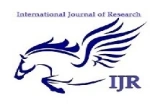

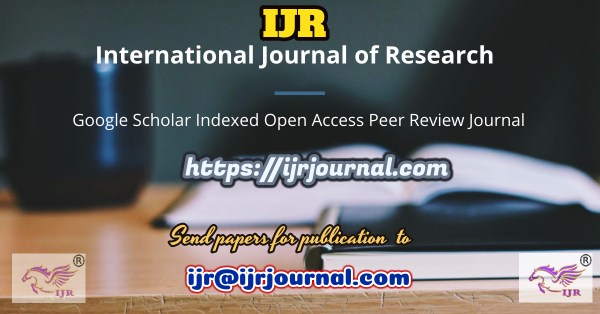
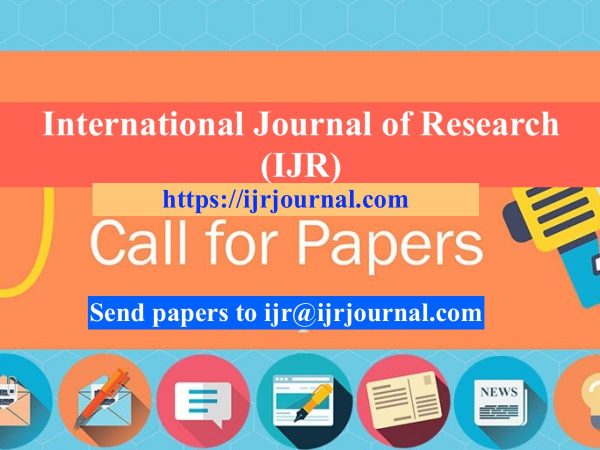
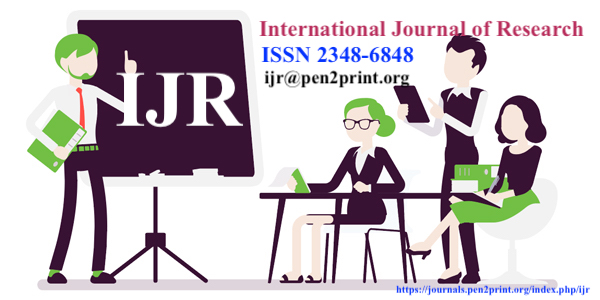

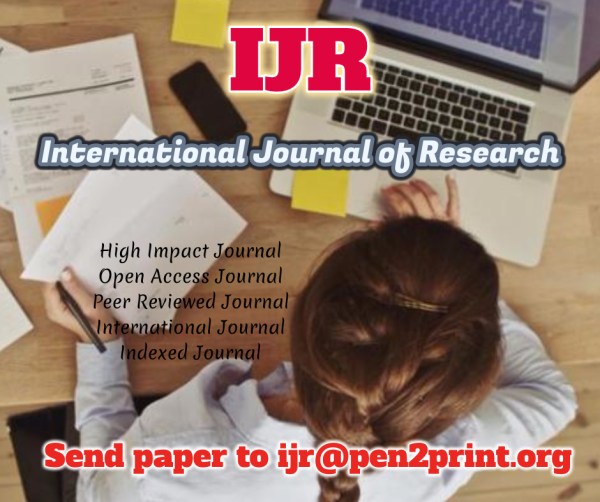
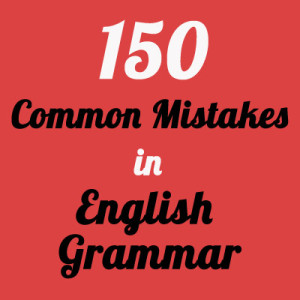
 International Journal of Research (IJR) have the team of Scientists and Academicians who are dedicated to help, learn and improve that skill by providing a guidance for writing high quality research papers. In depth evaluation of each research paper is a prime focus of every member of International Journal of Research (IJR) Reviewer Panel ensuring the novelty in each research manuscript being published.
International Journal of Research (IJR) have the team of Scientists and Academicians who are dedicated to help, learn and improve that skill by providing a guidance for writing high quality research papers. In depth evaluation of each research paper is a prime focus of every member of International Journal of Research (IJR) Reviewer Panel ensuring the novelty in each research manuscript being published.